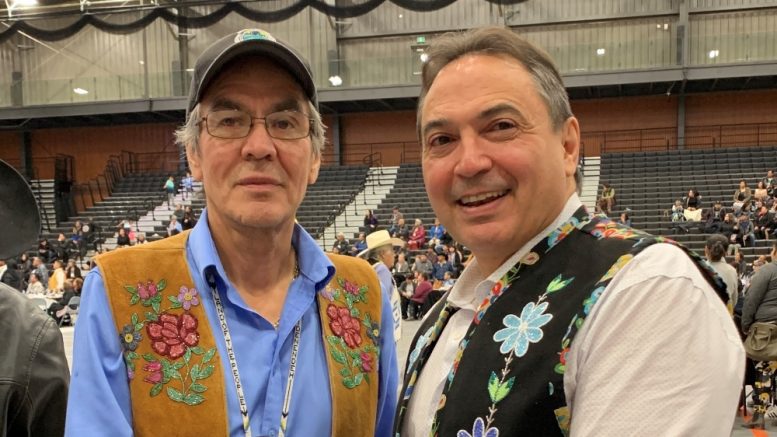Submitted by Dene Nation
When the COVID-19 pandemic was on the Denendeh horizon, Dene National Chief Norman Yakeleya says he made protocol and asked one of his Elders what his people should do to keep safe.
“He said, ‘We heard about this before from our Elders, that something like this is going to come into our land and to prey’,” Yakeleya said. “Then, the Elder said, ‘Our ancestors told us to go to the land, go back to the land’.”
Yakeleya explained that this conversation led to the NWT’s “At Home on the Land” initiative, which encouraged Indigenous families to go out on the land to curb the spread of COVID-19. On March 30, Indigenous Services Canada announced $2.6 million in funding for the initiative.
“The funds will support many other families who would not otherwise be able to be on the land because of the financial burden of acquiring necessary provisions,” Indigenous Services Canada and the N.W.T. government said in a joint news release.
“When equipped with the proper supplies and equipment, going on the land in small groups is a positive and healthy form of physical distancing.”
By working with people in different levels of government who understood the value of what the Dene were saying, as well as with younger Dene people who know the language of government and could get their attention, Yakeleya said the Dene Nation was able to make a strong funding case for the initiative.
“It’s a combination of many good people speaking the same language, and seeing the wisdom and value,” he said. “Everyone saw the purpose and the goal of helping each other, especially with COVID being at the forefront, and the safety mechanisms [needed].”
Ultimately, the Dene national chief credits the success of the initiative to the wisdom of the Elders, and the leaders and people that heeded their call. Yakeleya said the Elder’s message to go back to the land may seem like a simple concept, but its meaning is much deeper. Not only does it align with medical guidance for preventing the spread of the coronavirus, but also the cultural and spiritual learning that the Dene need to reconnect with.
“Really, what he was telling us is that if you want to know who you are as Dene go back to the land,” Yakeleya said. “All our medicines, all our teachings, our way of life is there, all our language.”
According to Yakeleya, governments have a responsibility to support this kind of on-the-land learning. The land means everything to the Dene. Canada denied the Dene their existence by taking them off the land, putting them into residential schools, and “wanting us to be somebody else who we aren’t,” said Yakeleya. He said pointing this out to federal and territorial partners helped the Dene make their case for their initiative.
“Part of the reconciliation with government is now putting our people back on the land where we come from,” Yakeleya furthered. “We are people of the land and we need to have this for the next 100 years.”
Yakeleya hopes that this initiative becomes a model for future partnerships with governments.
“It was a really powerful move that government took this initiative, put millions of dollars to help our people get on the land, the territorial government got out of the way and said ‘Let’s do this direct funding into the communities and have support there for policies,” he said.
“I think that should be one of the core programs in government. This is not just a one-off, but now should be a core-program for all the land initiatives across Canada.”





